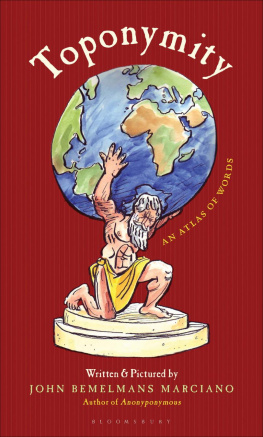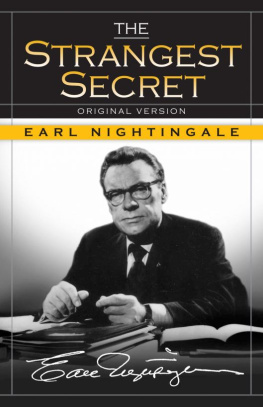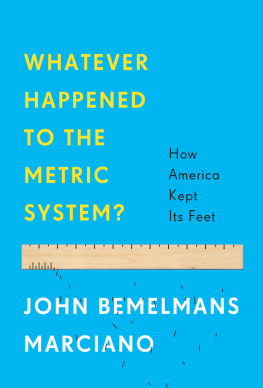anonyponymous
THE FORGOTTEN PEOPLE BEHIND EVERYDAY WORDS
John Bemelmans Marciano

Copyright 2009 by John Bemelmans Marciano
All rights reserved. No part of this book may be used or reproduced in any manner whatsoever without written permission from the publisher except in the case of brief quotations embodied in critical articles or reviews. For information address Bloomsbury USA, 175 Fifth Avenue, New York, NY 10010.
Published by Bloomsbury USA, New York
All papers used by Bloomsbury USA are natural, recyclable products made from wood grown in well-managed forests. The manufacturing processes conform to the environmental regulations of the country of origin.
LIBRARY OF CONGRESS CONTROL NUMBER: 2009928110
ISBN 978-1-59691-653-1
First U.S. Edition 2009
1 3 5 7 9 10 8 6 4 2
Interior design by Sara E. Stemen
Printed in the United States of America by Quebecor World Fairfield
For my father
CONTENTS
The smiling gent you see on the front cover is John Montagu, the fourth Earl of Sandwich. If hes grinning it might be because hes famous, saved from oblivion by the way he liked to snack, with a slab of salt beef stuffed between two pieces of toast. Or maybe its because hes just won big. The earl was such a degenerate gambler that he once stayed at the wagering tables twenty-four hours straight, which is why he invented the sandwich in the first placeso he wouldnt have to get up.
The Earl of Sandwich is famous for being the man behind a word that most people never thought was named after anyone, a man both anonymous and eponymous or, to coin a term, anonyponymous.
As a word, eponymous is a bit anonymous itself. Its moment in the sun came with the release of REMs album Eponymous , a subtle dig at musicians who name records after themselves, such as Peter Gabriel, whose first four albums are all entitled Peter Gabriel . In short, an eponym is anything thats ever been named after anybody. The title of an autobiography, the name of a legal firm, Mercedes-Benz, Washington Stateanything.
But eponymy doesnt necessarily involve the conscious act of naming. An eponym can also be a word that explodes into the language because of who a person is or what he or she did, often to that persons dismay. For how this happens, heres a firsthand account by Dr. Frasier Crane, as told to Sam Malone in an episode of Cheers :
Frasier , explaining being left at the altar : The story of my humiliation spread like wildfire through the university, and then to the entire Italian countryside. Everyone knew about it, everyone knew about my shame. Sam : Nawyou must have been imagining that. Frasier : Oh, was I? Do you know that in soccer, when a player kicks at the ball, misses, and falls down, its now called a Frasier? Sam : That could be a coincidence. Frasier : If hes knocked cold, its called a Frasier Crane.
Names often get used in this type of descriptive shorthand, like with, That kids a real Einstein, or, He pulled a Bernie Madoff. But a name only crosses into true word-hood once it is no longer used as a reference. When we speak of hectoring wives and philandering husbands, it is without a picture of valiant Hector or lover-boy Philander popping into our minds, the way a bespectacled Viennese man with a pipe does when we say Freudian slip. To be considered anonyponymous, a word must pass the Viennese pipe test.
So what are the other criteria? First, that the word be an eponym, the determining of which can present more of a challenge than you might think. Like most New Yorkers, I long believed the Outerbridge Crossing got its name from being the bridge farthest from downtown, and was shocked to learn that it instead honored Eugenius Harvey Outerbridge. Outerbridge is an example of the perfectly well-suited name, or aptronym, and whether a person is eponym or aptronym can be a chicken-or-the-egg proposition. Sometimes a famous name mirrors an existing term and reinforces it, as might have happened with Philadelphia whiskey maker E. G. Booz. There also lurks the possibility of nominative determinism, when someones name influences what they becomeperhaps what drove Learned Hand to become one of the most influential justices in U.S. history.
The other half of the equationthe anonymous partcannot be decided absolutely, as everyones know ledge is different. Most readers will know some of the characters in the following pages; the hope is that all the figures will be a surprise for the majority of readers. My editor thought Guy Fawkes had become too familiar due to the V for Vendetta mask, but I had never seen the movie. I since have, but not everyone has made the same mistake. Age is a big dividing line, and what is an eponym to one generation will be an anonyponym for the next. On the brink is a word like hoover , gaining traction as a verb meaning to suck something up. Its vibrant onomatopoeic quality almost assures its continued use among those ignorant of its origins, but I can never get out of my mind that its the name of a vacuum manufacturer, so it failed the Viennese pipe test.
Not everyone who qualifies under the rules made it into the book, of course. In general, I preferred naturally occurring, Frasier Cranetype eponyms, so mythological figures and fictional characters were preferred to inventors and scientists: hence the absence of such delightful names as Henry J. Heimlich (maneuver), Robert Wilhelm Bunsen (burner), and Fernand Lamaze (class). Finally, there were those people who didnt qualify but I included anyway, such as the Marquis de Sade (because how could I leave out the Marquis de Sade?).
One person I didnt feel comfortable bending the rules for was our friend the Earl of Sandwich, who has become famous for his very obscurity. I do, however, want to propose the earl as patron saint of the anonyponymous. His example shows that there is hope for the forgotten figures populating the following pages, that perhaps their lives can also be pulled out of the shadows of history for the wider world to recognize. Its fair to ask, however, why should they be?
All words are abstractions. But words also have histories, and by unwinding them, we gain access to the hidden richness of our language. The absolute origins of words are for the most part unknowable; what makes eponyms extraordinary is that we can point to the moment of their birth and to the lives of the people from whom they sprang.
But why anony ponyms? Blame Etienne de Silhouette. When I looked up the etymology of the word silhouette and saw his name, I thought a virus had somehow infected my copy of the OED. It seemed like a prank, and indeed, Monsieur Silhouette and many of the other folks herein would see their peculiar fame as exactly that. In the anonyponymous, biographical history and the dictionary intersect in the realm of the ridiculousand also of the remarkable, the delightful, and the fascinating.
I hope you enjoy these words and the people behind them as much as I have.

algorithm n. A set of rules for solving a problem.
No, the first anonyponymous person in the book is not Al Gore.
When a word begins with al- , theres a good chance it comes from Arabic. This is true with alchemy, almanac, alcove, alcohol (ironically), and algorithm , named for Muhammad ibn Musa al-Khwarizmi, or, as his Latin translators called him, Algorismus.
In the early ninth century Baghdad was fast becoming the worlds most important center of trade and learning, and while engaged at its illustrious House of Wisdom, al-Khwarizmi produced his most famous work, The Book of Restoring and Balancing . In it, al-Khwarizmi explained how to solve complex mathematical equations by a method called al-jabr , Arabic for reunion of broken parts, which came rendered in Latin as algebra. (See about those al- words?) On an even more basic level, al-Khwarizmi was instrumental in the spread of Arabic numerals. Not that he invented them, nor did anyArab; the symbols originated on the Indian subcontinent in the centuries leading up to Christ.
Next page













